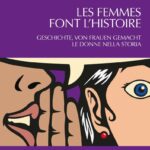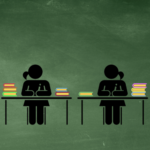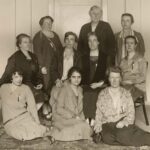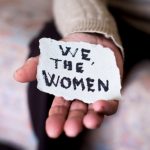 Didactica Historica (Web)
Didactica Historica (Web)
Die Didactica Historica erscheint seit 2015 als Jahresheft der schweizerischen geschichtsdidaktischen Gesellschaften. Ihre Beiträge fokussieren auf die Vermittlung von Geschichte. Sie befassen sich mit der Theoretisierung des Umgangs damit, berichten von seiner empirischen Erforschung, dokumentieren Vermittlungsprozesse in Schule und Gesellschaft, präsentieren Materialien für den Geschichtsunterricht und rezensieren Neuerscheinungen. Die Beiträge erscheinen in deutscher, französischer oder italienischer Sprache, in Ausnahmefällen auch in Englisch. Die Beiträge aller bisherigen Hefte (ausser dem aktuellen) sind auf der Website der Zeitschrift frei online verfügbar.
Didactica Historica 8/2022: Les femmes font l’histoire | Geschichte, von Frauen gemacht | Le donne nella storia (Web)
Die Ausgabe hat den Schwerpunkt Frauen*- und Geschlechtergeschichte: Wie werden Geschlechterverhältnisse in verschiedenen historischen Kontexten und gesellschaftlichen Debatten konzipiert, gelebt, gerechtfertigt und eingefordert? Wie ermöglicht Geschichtsdidaktik mit historischen Themen in geschlechtergeschichtlicher Perspektive historische Orientierung und Positionierung von Schüler*innen?
Didactica Historica 8/2022 widmet dieses Dossier den Geschlechterverhältnissen, der Geschichte des Feminismus und dem Engagement für Emanzipation, dem Kampf für gleiche politische, wirtschaftliche und soziale Rechte. 18 Beiträge erkunden Baustellen der Geschichte und laden dazu ein, den Platz der Frauen und ihre Agency in der Geschichtsschreibung und in der gelehrten Geschichte neu zu überdenken. Weiterlesen … (Web)

 i.d.a.-Dachverband: Digitales Deutsches Frauenarchiv (DDF)
i.d.a.-Dachverband: Digitales Deutsches Frauenarchiv (DDF)  fernetzt. Verein zur Förderung junger Forschung zur Frauen- und Geschlechtergeschichte
fernetzt. Verein zur Förderung junger Forschung zur Frauen- und Geschlechtergeschichte  Österreichischen Mediathek
Österreichischen Mediathek  The Aga Khan University’s Institute for the Study of Muslim Civilisations (AKU-ISMC), London
The Aga Khan University’s Institute for the Study of Muslim Civilisations (AKU-ISMC), London  Aspasia. The International Yearbook of Central, Eastern, and Southeastern European Women’s and Gender History
Aspasia. The International Yearbook of Central, Eastern, and Southeastern European Women’s and Gender History 
